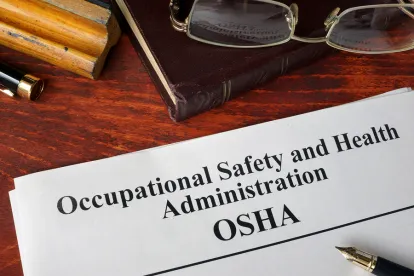After releasing an Emergency Temporary Standard (ETS) for COVID-19 for healthcare employers on June 10, 2021, the Occupational Safety and Health Administration (OSHA) has announced that it is publishing the ETS in the Federal Register on June 21, 2021.
Requirements Enforceable on July 5, 2021
The publication gives the ETS immediate effect, but most elements of the ETS will not be enforceable for 14 days, on July 5, 2021.
Those requirements include:
-
A COVID-19 plan, which must be in writing for covered healthcare employers with more than 10 employees;
-
Patient screening and management;
-
Policies and procedures to adhere to standard and transmission-based precautions based on guidelines promulgated by the Centers for Disease Control and Prevention (CDC);
-
Personal protective equipment, including face masks while workers are indoors or in vehicles together and respirators when employees are exposed to or engaging in aerosol-generating procedures with individuals with known or suspected cases of COVID-19;
-
Additional requirements to limit exposure and to disinfect areas when engaging in aerosol-generating procedures with individuals with known or suspected cases of COVID-19;
-
Physical distancing while indoors;
-
Cleaning and disinfection in accordance with CDC guidelines;
-
Paid leave for vaccinations and recovery;
-
Anti-retaliation protections for engaging in actions required by the ETS;
-
For covered healthcare employers with more than 10 employees, a COVID-19 log;
-
Reporting COVID-19 fatalities and hospitalizations to OSHA; and
-
Medical management requirements, including:
-
Daily health screenings;
-
Employee notification of employers if an employee tests positive for COVID-19, suspect they have COVID-19, or have symptoms;
-
Employer notification of employees within 24 hours of known cases;
-
Removal of employees from the workplace in accordance with CDC guidance; and
-
For covered healthcare employers with more than 10 employees, medical removal protection benefits for isolated or quarantined employees.
-
All requirements must be implemented at no cost to employees. The ETS exempts fully vaccinated employees from wearing a mask, social distancing, and barrier requirements when the employer determines there is no reasonable expectation another person with suspected or confirmed COVID-19 would be present. It is unclear how this determination can be made, however.
Requirements Enforceable on July 21, 2021
Three remaining requirements will be enforced beginning on July 21, 2021. Those requirements are:
-
Installation of physical barriers at workstations where employees cannot remain physically distant (six feet apart) from others;
-
Effective onsite ventilation; and
-
Employee training on COVID-19 risks and mitigation.
Healthcare Employers Covered by the ETS
The ETS covers healthcare settings where COVID-19 patients are treated, including:
-
Hospitals;
-
Nursing homes;
-
Assisted living facilities;
-
Ambulatory care facilities treating individuals with known or suspected cases of COVID-19; and
-
Any other settings where employees provide healthcare services or healthcare support services.
The ETS carves out these exceptions:
-
First aid provided by employees who are not licensed healthcare providers;
-
Distribution of prescriptions by pharmacists in retail settings;
-
Non-hospital ambulatory care settings where non-employees are screened for COVID-19 before entering and people with suspected or confirmed COVID-19 are not permitted to enter;
-
Well-defined hospital ambulatory care settings where all employees are fully vaccinated and non-employees are screened for COVID-19 before entering, and people with suspected or confirmed COVID-19 are not permitted to enter;
-
Home healthcare settings where all employees are fully vaccinated and non-employees are screened for COVID-19 before entering, and people with suspected or confirmed COVID-19 are not present;
-
Healthcare support services not performed in a healthcare setting; and
-
Telehealth services where no direct patient care occurs.
State Plan States
It remains unclear what effect the ETS will have on requirements for healthcare employers in the four OSHA “State Plan” states that have enacted their own COVID-19 standards under their authority pursuant to the Occupational Safety and Health Act. These are California, Michigan, Oregon, and Virginia. State Plan states must enact standards and run programs that are “at least as effective as” OSHA’s. Healthcare employers also will need to be aware of the myriad state and local requirements relating to COVID-19 in healthcare settings.





 />i
/>i
